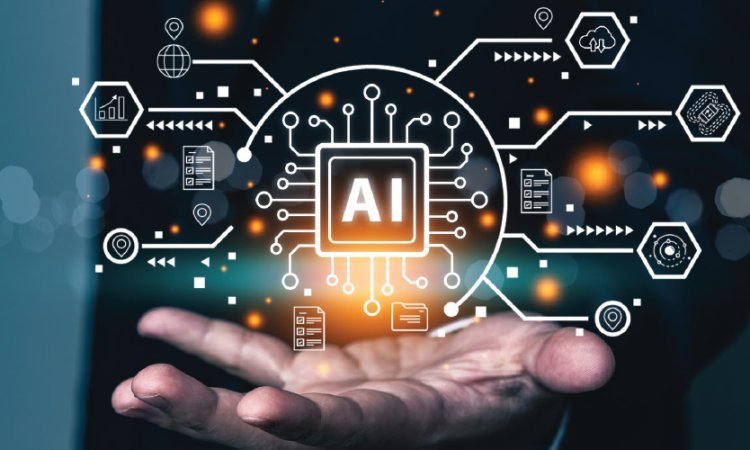AI Technology: Revolutionizing the Future
In this blog, we’ll explore what AI technology is, how it works, its key applications, and the future potential it holds.

Artificial Intelligence (AI) is no longer a concept confined to science fiction; it’s transforming industries and everyday life in unprecedented ways. From automating mundane tasks to making critical decisions, AI technology is rapidly becoming integral to our world. In this blog, we’ll explore what AI technology is, how it works, its key applications, and the future potential it holds.
What is AI Technology?
AI technology refers to the simulation of human intelligence in machines that are designed to think, learn, and solve problems like humans. These systems can perform tasks such as speech recognition, decision-making, visual perception, and language translation, previously requiring human intelligence.
How Does AI Technology Work?
AI technology operates through a combination of machine learning (ML), neural networks, natural language processing (NLP), and deep learning algorithms. Here's how some of these key components work:
- Machine Learning (ML): ML allows systems to learn from data and improve their performance without being explicitly programmed. It involves feeding vast amounts of data to algorithms, which then make decisions or predictions based on patterns in the data.
- Neural Networks: These are computational models inspired by the human brain, consisting of layers of nodes that process data inputs. Neural networks excel at recognizing complex patterns, such as images or speech.
- Natural Language Processing (NLP): NLP enables machines to understand, interpret, and respond to human language in a way that feels natural. This is the technology behind chatbots, virtual assistants, and language translation services.
- Deep Learning: Deep learning is a subset of machine learning that uses neural networks with many layers (hence "deep"). It excels at analyzing unstructured data like images, video, and text.
Key Applications of AI Technology
AI technology is already making a significant impact across a range of industries. Here are some of the most prominent applications:
1. Healthcare
AI is revolutionizing healthcare through predictive analytics, precision medicine, and diagnostic tools. For example, AI-powered systems can analyze medical images to detect conditions like cancer at an early stage, potentially saving lives.
2. Finance
AI technology is used in finance for fraud detection, risk management, and automated trading. Algorithms analyze massive amounts of data in real time, helping financial institutions make informed decisions and protect against security threats.
3. Automotive Industry
The automotive industry is harnessing AI for the development of self-driving cars. Autonomous vehicles use AI technology to process information from sensors, cameras, and radar systems, enabling them to navigate roads and make decisions safely.
4. Retail
Retailers are using AI to personalize shopping experiences, manage inventory, and even develop smart customer service systems. AI-powered chatbots, for example, can help answer customer queries 24/7, enhancing customer experience and reducing operational costs.
5. Education
AI-powered educational tools offer personalized learning experiences. They can assess a student’s strengths and weaknesses, adapt learning materials accordingly, and provide real-time feedback, helping students learn more efficiently.
Benefits of AI Technology
AI technology offers numerous benefits across various sectors:
- Increased Efficiency: AI systems can process data and perform tasks faster and more accurately than humans, leading to improved productivity.
- Cost Reduction: By automating routine tasks, businesses can cut down on operational costs and redirect human resources to more complex tasks.
- Improved Decision Making: AI systems can analyze large datasets quickly, allowing for more informed, data-driven decisions.
- Personalization: AI enables businesses to offer personalized experiences, from customized product recommendations to targeted marketing strategies.
The Future of AI Technology
The future of AI technology is incredibly promising. As AI systems become more sophisticated, we can expect to see advancements in fields like healthcare, environmental sustainability, and space exploration. Here are some potential developments:
- General AI: Unlike narrow AI, which is designed for specific tasks, general AI would have the ability to perform any intellectual task a human can do. While we’re still far from achieving this, researchers are making steady progress.
- AI in Climate Change: AI could play a significant role in combating climate change by optimizing energy consumption, predicting natural disasters, and managing resources more efficiently.
- Human-AI Collaboration: As AI systems become more advanced, we’ll likely see more collaboration between humans and AI, allowing us to tackle complex global challenges more effectively.
Ethical Considerations
While AI technology offers immense benefits, it also raises ethical concerns. Issues such as job displacement, data privacy, and AI decision-making accountability need to be addressed. Ensuring that AI is developed and implemented responsibly is crucial for its long-term success.
Conclusion
AI technology is shaping the future in ways we could have only imagined a few decades ago. From revolutionizing industries to enhancing everyday life, its impact is undeniable. As this technology continues to evolve, it will be essential to embrace its potential while carefully considering the ethical implications.
AI isn’t just a trend; it’s a transformative force that will define the future of human progress.
What's Your Reaction?
















